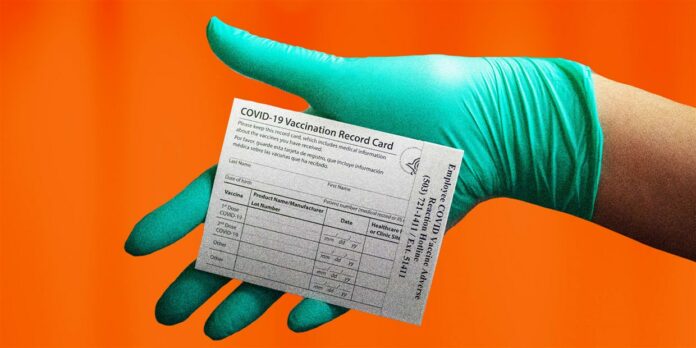Posting your vaccination isn’t just feed fodder
I got stabbed two weeks ago, thanks to Pfizer. It’s been a long time coming, this vaccine of ours, and I can say with confidence that we’re all breathing a collective sigh of relief. We’re finally starting to see the light at the end of the tunnel. After the arduous ordeal of getting an appointment, the only signifier I have of my vaccination excitement and partial immunity is a little 3-by-5 index card that I’ve hung on my wall.
Everything is Instagrammable. Whether it’s an overpriced piece of avocado toast, your classic Davis sunset or someone’s newborn baby, we’ve learned to filter and post it without any second thoughts. It’s only natural then that the COVID-19 vaccination campaign has become the newest subjects of our Instagram photographs.
I’ve found myself wondering if I’ll break the news of my vaccination on social media. I’m not one to frequently post Instagram stories, but vaccine card posts are all the rage these days. I wouldn’t be surprised if I succumbed to the trend––it allows us to band together in our final show against the pandemic. We entered this mess of a pandemic together, suffered collectively and we’ve decided to walk out of it with linked, bandaged arms.
The first reason why vaccination posting is trending has to do with brands. Our obsession with brands and brand loyalty pervades every facet of our lives. The concept of brand loyalty has been imbued in us from a very early age. Having Eggo waffles as our breakfasts every day before school, for example, isn’t a result of there only being Eggo waffles on the market; we’ve just developed a collective loyalty towards the Eggo brand.
Social media has allowed for businesses to further exploit our love of brands online through influencer promotions and incessant ad-pedaling. Products like hair gummies and personalized shampoo brands have developed cult followings not because of their quality, but from the amount of influencer clout they’ve gotten over the years. And in terms of being an influencer, there’s really no consequence to this sort of “selling out” like there used to be. The term “selling out” used to have negative connotations. Nowadays, if you’re being sponsored by bajillions of random brands, you’ve effectively made it big in the world of social media.
Since not all of us are fortunate enough to become rich influencers with brand deals, we’ve found ways to emulate the social media stars that we see around us in the COVID-19 age. When we develop these cult-like followings for something as arbitrary as a vaccination brand, we elevate Pfizer or Moderna’s “social currency,” or the clout they receive from word-of-mouth social media interactions. The posts we make about the “Pfizer gang” elevate the status of Pfizer as a company. This can work in the opposite way too. When Johnson & Johnson’s vaccine supply was halted, social media users flocked to the Internet to make a mockery of the company, ultimately harming communities that desperately needed the convenient one-shot vaccine. What we post on social media about vaccines has a huge effect on how we can move forward with the pandemic.
Vaccination posting also appeals to our own personal brands. When we post our vaccine cards, it helps cultivate that social media persona that we endlessly yearn for. Before the vaccine became widely available, a 20-something’s vaccination card post probably meant that you were a university student with an important job or someone with a lot of connections to the upper echelons of the healthcare industry. Seems pretty prestigious, no? You also have the added benefit of being perceived as a morally upstanding and science-brained human being.
Even though it may seem superficial, vaccination posting has a genuinely positive effect on social media’s ongoing battle between science and myth. The internet is fraught with anti-vaccination conspiracy theorists that post just as frequently as any pro-science user does. The more that we are able to flood social media feeds with pro-vaccine posts, the more normalized it becomes. The chances that we can bring people into the vaccination process is higher, therefore making our world a bit safer.
By: Isabella Chuecos –– ifchuecos@ucdavis.edu
Disclaimer: The views and opinions expressed by individual columnists belong to the columnists alone and do not necessarily indicate the views and opinions held by The California Aggie.





